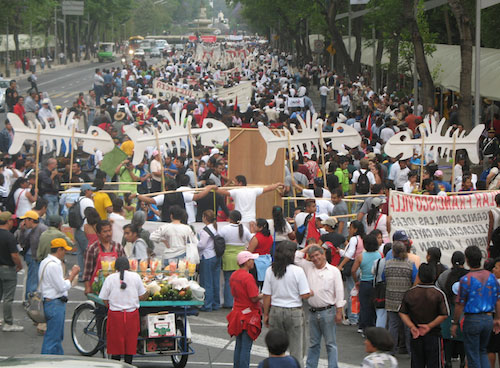INTERVIEW WITH PEDRO ARROJO
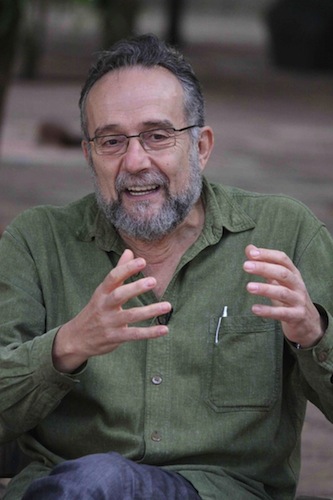
Docteur en Sciences Physiques, Professeur d’Analyses Economiques (Economie de l’Eau)
à l’Université de Zaragoza (Espagne).
Fondateur du mouvement pour la Nouvelle Culture de l’Eau.
Il a reçu en 2003 le Prix Goldman, considéré comme le Prix Nobel de l’Ecologie alternatif.
WATER-RIVERS-PEOPLE
THE ORACLE AND THE AFFECTED PEOPLE
How did I get involved from the start in the New Water Culture ?
First of all, it was through an intellectual search, when I had to decide the investigation line for my doctoral thesis. From the economic domain, I suspected that the oracle of economic rationality, which apparently prevails on great decisions of our modern society, same as others times, is a deceitful power oracle. Particularly, I suspected that in the case of big hydraulic works and water management, where so much public money is invested, the oracle of economic rationality was not working rigorously.
I wanted to study if the big works that threatned to flood villages at Pyrennees Mountains (between France and Spain) were justified in terms of investment. I found out there was no economic rationality behind these projects.During my research I met people from villages that were under threat to be flooded. When you talk to people victims of this kind of problem, and that they finally decide to speak, first they cry…
Together with the intellectual motivation of finding oracle traps of false economic rationality, what I was just snatched by the emotion of seeing people crying, seeing the disaster that means to erase their reality, their village, their valley.
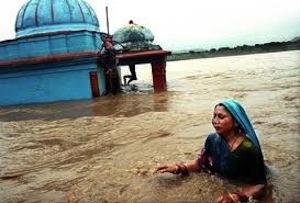
NEW WATER CULTURE
In the university, I started as physicist, and then I was engineer with doctorate thesis about the fluid mechanics, to conclude as researcher and professor of economy of natural resources, ecological economy. In this university line, we created with other people the Foundation for a New Water Culture, and the Iberian Congress that gathered 70 universities from Spain and Portugal. For me, it was the matter to open into the academic domain a new logic of management of water, rivers, ground waters. A logic to agree with the paradigm of sustainability, with an ethics vision of social and environmental justice.
We started promoting the social movement for a New Water Culture, starting with a social fight of groups and communities that in the beginning of 90’s were threatened by the construction of new dams.
We formed Coagret, the coordination organization of those affected by heavy hydraulic works.
Ebro River Raid was our first direct action. It was like a dream. We built a large ship with three big heads of Iberia dragon, from Iber (Ebro), the Roman name of the river that passes by my city. During one month and a half, we went down the river with 20 people onboard. We were followed by hundreds cyclists by the shore.
Together with the population of the Ebro basin, we carried out many actions to protect our river.
Later, mobilizations were happening.
We did a one-month hunger strike. The great demonstrations brought together 400,000 people in Zaragoza, 300,000 in Madrid, and 300,000 in Barcelona. In less than one year, we had more than one million people in the streets questioning the National Hydrological Plan and proposing a New Water Culture with a new focus on water management.
Finally, with the Marcha Azul (Blue March) among 14 000 people walked to Brussels. With this, we successed to block the assignment of funds from European Union for the Spanish National Hydrological Plan. After that, I got surprised for receiving Goldman Environmental Prize, which opened more international debate space for these ideas of the New Water Culture.
New Water Culture is a new paradigm on water issue with two basic components : the rational (for a new XXI century rationality) and the emotional (about human rights).
We talk about “new culture” not only because it requires new politics, new laws, new technologies. There is something deeper. We need to change the values order and understand that, in the name of getting even richer than we are, we do not have the right to kill sustainability.
We need to reassemble the human relationships about the water topic, and beyond it, to link them to the participating democracy.
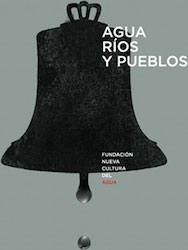
WATER-RIVERS-PEOPLE
In 2000, the World Commission on Dam’s report is published at London, an interesting study about the impact of great dams around the world.
In their conclusions, there is a paragraph which always shocked mer : it was possible to measure how many cubic meters of water can be stored in almost 50,000 great dams we had built in the world in the XX century; however, it was not possible to specify how many people had to be removed by force from their homes and villages to flood them. In the end we estimate between 40 and 80 million of people were directly affected by big dams.
The most shocking is not only the importance of the scale of this data but its imprecision. The range from 40 to 80 million demonstrates the invisibility of the affected people. In conversing with Patrick Mc Cully, from International Rivers Network, we saw the need to launch an international initiative which can put those affected people in first plan.
Then, talking to other international groups, we realized that the problem of invisibility of those victims was not limited to the great dams.
It was also the case of 1.200 million of people (also a very estimative number) who do not have access to drinking water. Among 10 thousand and 20 thousand of people die daily of this reason.
All of that turns into pure statistic. You never see a woman, whose child died because he drunk contaminated water, explaining this fact and looking into your eyes, with tears and anger.
Then, the project Water, Rivers, People was born, with 6 thematic areas which cover case studies in the whole world. One area is about massive displacement of population; the other is about the access to drinking water as a human right, the other about the fight against privatization of the water and territories; the other about the vulnerability of the poorest communities in front of natural catastrophes (and not so natural actually) ; the other focuses on destruction of ecosystems and fishing, with the correspondent impact of hunger. Other chapter portrays the non-declared wars, as it is happening in Palestine or in Kurdistan, where water is used as blackmail against population. Finally, the chapter dedicated to positive leadership and good practices of the water management.
When I am asked what is the purpose of this exhibition, I answer to give voice and existence to those affected by different sorts of trauma, problems and water conflicts. These victims, maybe, does not have “the reason” and even, with all probalities, they do not have “the solution” for problems which are extremely complex, but they suffer from the problems and they deserve to be listened. Authors pictures and audiovisual works, which are part of the exposition, put us face to face to those affected ones by action or omission of hydraulic politics.
Behind this, we opened a discussion,which everybody is invited, people who are for as people who are against. The goal is to move awareness and hearts, arousing intelligence and involving wills in front of what is known as world water crisis.
WORLD WATER CRISIS
We have limited the most plentiful resource in the Water Planet. Water keeps plentiful in quantity but not in quality. We have broken up the health of the rivers. First, fishes and frogs have disappeared; then, people start dying.
The world crisis is the result of critical failures : unsustainability and inequality. In the convergence of these failures are these 1,200 million of people who do not have access to drinking water. The problem has worsened when big economic powers understood that the shortage of quality water is a fantastic opportunity of business. This encourages a privatization politics of water, rivers, aquiferous, services of draining. “The markets” do not understand that the access to water is a human right ; they have to convert the citizen into clients. Then, the third failure comes : the democratic governance of basic water and draining services under privatization pressures.
We are reaching such point that everybody, including big powers, is forced to face for thoughtless solutions until now. Among them are the power of the people, those who pay for the lack of responsibility and humanitarian disaster we have generated the richest people. We are in XXI century with need to rethink about the economy and politic play rules. This is not going to be a linear process, but there is some advances particularly about water. If we look into European and American legislations, as European Water Framework Directive, we will see the environmental matter is imposed ; we cannot no more treat rivers as “H2O channels”. As the same for forests, they cannot be treated as wood warehouses, and not only for ecological questions but also an economic rationality, by clever selfishness. The aquatic ecosystems are not resource warehouses, are living systems that you have to question under new logic of sustainability.
We are going to see how these countries start articulating different ways of management of water, where the concept of sustainability is ranked in first. Of course, frequently in a hypocritical way. The same economic sectors recognize the need to perform things in different way in Europe or in USA, keep polluting rivers in other places and moving this old-fashioned way of thinking about unsustainable to “developing” countries. There is also here the power of rebellion and predators are meeting with popular reactions, which are questioning about their strategies . And, then, a new ethic is rising. This does not come from Europe nor USA, but in Latin America, in Asia… and it spreads, because, definitely, the perspective for a new ethic focus for XXI century is opening.
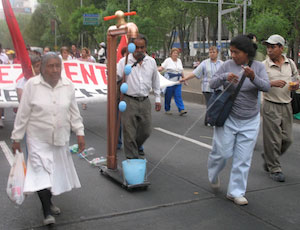
ADMIRATION AND FEAR
In 2004 was the first time I visited Itaipu hydroelectric (Brazil-Paraguay) in a trip to Paraguay. I could enter into the dam, see the installation and I remember I got shocked front of dimension of this work. It was so incredible I got shocked. I remember I was very moved when I was in the ‘gut’ of the dam. One side, for the admiration feeling. It is as if you place yourself in front of a pyramid, and you got impressed, you got touched by ability for what we are able to do. But also for a feeling of fear: what is our limit to break the natural order to produce good things or to produce disasters ? Later, in World Social Forum in Belem (2009) was the first time I have heard about Agua Boa. When I came back to Itaipu on October 2010, I could know the program better and deeper.
I want to clear one thing up. Now, if you ask me if we had to build a dam like Itaipu, I would say that it could be atrocity. However, we cannot control the technology to intervene in such a savage way into an ecosystem as incredible as Parana River. The costs of the investment also are not so easy to recover. This was the conclusion reached in Europe and USA: that is why this sort of big dam is not made anymore. If I had to decide to do it or not, today my answer would be “no” by economic, social and environmental reasons.
ABOUT AGUA BOA
However, the question is not about approaching or not Agua Boa. Dam is full and I have the impression that their directors have created a different model of management from what they have in their hands. In this case is a big dam that produces hydroelectric power. They checked that this patrimony could be administrated in a different way. In addition, they built a dam different from any big dam I have ever seen in the world or any big public company. Because, in the end, it is about a big public company that produces a large number of power and provide important economic and financial capacities. What Agua Boa and their leaders have done is not only a matter of how manage the water in Alto Parana but also how to manage a territory, how revitalize the democratic mechanism in the communities and in the cities of the area.
The most valious is how Brazilian people know to build or is building, in practice, what they have baptized as “participative democracy” around this pedagogical water platform. In essence, the democracy shall be participative, but we have degraded it so much we have, now, to give an adjective for it.
For me Agua Boa is: the pedagogical water platform taken into a new social organization model, a new model of education, of health, of production and distribution of food, a new model of citizen participation and political action. It is not only a Brazilian experience, it extends from Triple Frontier as a transnational mark and fill spaces in the government and social movements in Paraguay, Argentina, Uruguay, and Bolivia. For me, it looks more than a good local experience; it begins to appear an “contagious” character, extremely interesting.
However, I have followed it since Europe, and I would not dare to tell that this has an easy and automatic transferal to a context as in Spain. Of course, Brazil and Paraguay are in the same planet. It is important that this social, political and cultural movement and their different phases and processes be known in Europe. In the hot and to this practical example, replies will be succeeded, maybe less potent, in the “Old World”, because, although some advantages (money, technology, “culture”), we are more wore out ethically, morally more unarmed. The ways will be opened in Europe, they will not be the same, but they will be combined through common values and perspectives, inspired by what is done now in the “New World”.
MORE THERE
Water is the key for economy, but it also is the identity of the village, for our feelings, our concept of beauty and well-being. This transversality makes water as a suitable pedagogical platform to rethink about the world and society. The program Agua Bola shows it in practice. The movement for a New Water Culture in Europe also has inspired public politic proposals, which go beyond water, and need to do it with the organization of territory, in addition to the citizen participation. Water is the starting point for education towards new governance, towards a new model of politic and social actions that inspire and join rationalities and emotions.
When converging the rational into emotional, the energy we are able to develop the human being, the communities, the societies expands, creates synergies of a huge transforming power. Well, the arguments and motivations of the reason with the heart summarize around the water. In addition, maybe for this reason, water is a space to motivate and comprehend the challenges of social, environmental and cultural change required in XXI century.

